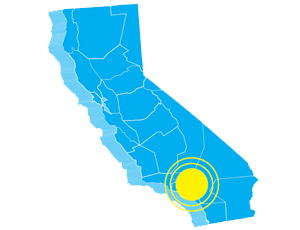If time is money, then Brutoco Engineering & Construction Inc. has saved cash-strapped California officials both. The Fontana, Calif.-based company won an American Recovery and Reinvestment Act-funded contract in September to widen the congested 91 Freeway in Orange County. Its bid came in at about $20 million below and more than 400 working days under what California Dept. of Transportation (Caltrans) officials estimated. Brutoco believes it can do the job in about 300 working days, says Tracey Lavelle, a Caltrans spokeswoman. “This is a very aggressive timeline by the contractor,” she says.

The project came along at the right time for Brutoco, says Michael Murphy, president of the 43-year-old company. “[The bid] had a unique twist on it. [It] isn’t strictly low bid,” Murphy says. “It’s, ‘How fast can you do the job?’ ”
Brutoco had the staff available to start work on the freeway right away, Murphy says. “We’re in need of some work, just like everyone else,” he notes. “It fit us very well.” Work is expected to begin in late October or early November.
Brutoco will widen the freeway over a four-mile stretch and add an eastbound lane. The contractor also will erect a series of retaining walls. The project is meant to relieve congestion on the highway, a critical link which transports thousands of commuters daily to and from California’s so-called Inland Empire of San Bernardino and Riverside counties. It is the state’s third-largest metropolitan area, with more than 4 million residents. Work on the freeway was recently listed among 21 “must-do” projects in Southern California by Mobility 21, a transportation advocacy group.
The Orange County Transportation Authority, which received $67.8 million in ARRA funds, worked with Caltrans to put the freeway project out to bid. The authority now can invest the remaining stimulus money into other projects throughout the county, says Lavelle.
The job was slated to begin construction soon, even without ARRA funding. The infusion of stimulus cash keeps the project on track, especially as other state revenue sources, such as Proposition 1B funds, may become unavailable, Lavelle adds.
Brutoco has done similar fast-tracked projects in the past. For instance, Murphy says the company, in 1994, repaired a section of damaged freeway in 93 days after the Northridge earthquake.
But the largess is not without strings. Lavelle says stimulus funds on highway projects will require monthly reporting to the Federal Highway Administration. Brutoco will have some additional paperwork as well, but the firm is still glad to have the work.
“It’s the type of job we would have gone after, stimulus or not,” Murphy says.

Post a comment to this article
Report Abusive Comment